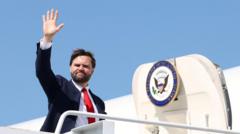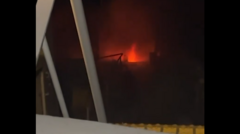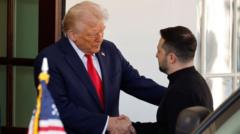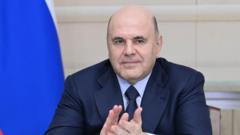In a recent interview, Vice-President JD Vance acknowledged that the war in Ukraine is unlikely to conclude soon, urging the need for both Russia and Ukraine to find common ground for peace.
Tensions Rise as U.S. Officials Discuss Ongoing Ukraine Conflict

Tensions Rise as U.S. Officials Discuss Ongoing Ukraine Conflict
U.S. Vice-President JD Vance emphasizes the protracted nature of the Ukraine war in a recent Fox News interview.
Nonetheless, the conflict continues to escalate as recent drone attacks and ceasefire proposals are met with ongoing hostilities.
In an interview with Fox News, U.S. Vice-President JD Vance stated that the war in Ukraine is "not going to end any time soon," indicating that diplomatic efforts will be necessary to resolve the escalating tensions. He described the current situation as needing both Russia and Ukraine to come together for an agreement, suggesting that the decision lies within the two nations to halt the "brutal, brutal conflict" that has marked the past three years.
His remarks followed a recent agreement between Washington and Kyiv that entails sharing profits from Ukraine's rare earth minerals as part of continuing U.S. security support. In defending former President Donald Trump's approach to the war, Vance acknowledged the Ukrainians' anger at their invasion, while questioning the wisdom of continuing to sacrifice thousands of soldiers over territorial disputes.
In a surprising proposal, Trump hinted that Ukraine might consider ceding Crimea, which has been under Russian control since its invasion in 2014, to forge a peace deal. However, President Volodymyr Zelensky dismissed that notion, referring to constitutional barriers preventing such an arrangement.
On another note, U.S. Secretary of State Marco Rubio stressed the urgency of achieving a "breakthrough" in the conflict, suggesting that a lack of progress may force Trump to rethink his strategy. Meanwhile, Russian President Vladimir Putin announced a temporary three-day ceasefire beginning May 8, coinciding with World War Two commemorations, in a gesture that has not yet led to a peaceful resolution. In a tit-for-tat escalation, Ukraine's foreign minister called for a 30-day ceasefire in response.
Despite these pronouncements, fighting persists. On Thursday evening, a drone attack by Russia on the southeastern city of Zaporizhzhia resulted in 14 injuries but no casualties. In retaliation, Moscow accused Ukraine of targeting civilians in a southern region, a claim that Ukraine refuted, insisting the attack was aimed at military personnel. The conflict remains complex, marked by both diplomatic overtures and ongoing violence.
In an interview with Fox News, U.S. Vice-President JD Vance stated that the war in Ukraine is "not going to end any time soon," indicating that diplomatic efforts will be necessary to resolve the escalating tensions. He described the current situation as needing both Russia and Ukraine to come together for an agreement, suggesting that the decision lies within the two nations to halt the "brutal, brutal conflict" that has marked the past three years.
His remarks followed a recent agreement between Washington and Kyiv that entails sharing profits from Ukraine's rare earth minerals as part of continuing U.S. security support. In defending former President Donald Trump's approach to the war, Vance acknowledged the Ukrainians' anger at their invasion, while questioning the wisdom of continuing to sacrifice thousands of soldiers over territorial disputes.
In a surprising proposal, Trump hinted that Ukraine might consider ceding Crimea, which has been under Russian control since its invasion in 2014, to forge a peace deal. However, President Volodymyr Zelensky dismissed that notion, referring to constitutional barriers preventing such an arrangement.
On another note, U.S. Secretary of State Marco Rubio stressed the urgency of achieving a "breakthrough" in the conflict, suggesting that a lack of progress may force Trump to rethink his strategy. Meanwhile, Russian President Vladimir Putin announced a temporary three-day ceasefire beginning May 8, coinciding with World War Two commemorations, in a gesture that has not yet led to a peaceful resolution. In a tit-for-tat escalation, Ukraine's foreign minister called for a 30-day ceasefire in response.
Despite these pronouncements, fighting persists. On Thursday evening, a drone attack by Russia on the southeastern city of Zaporizhzhia resulted in 14 injuries but no casualties. In retaliation, Moscow accused Ukraine of targeting civilians in a southern region, a claim that Ukraine refuted, insisting the attack was aimed at military personnel. The conflict remains complex, marked by both diplomatic overtures and ongoing violence.



















